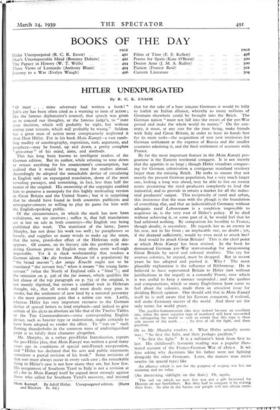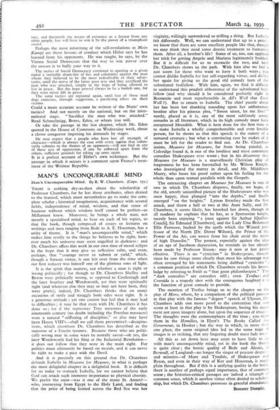BOOKS OF THE DAY
Hitler Unexpurgated (R. C. K. Ensor) Man's Unconquerable Mind (Bonamy Dobree) The Papacy in History (W. T. Wells) ... .
Three Views of Leonardo (Anthony Blunt) ...
Journey to a War (Evelyn Waugh) .
• • • • • • • - • • • • • • •
PAGE
491
492 494 494 496 Films of Time (E. E. Kellett) Poems for Spain (Kate O'Brien) Doctor Arne (J. M. A. Ridley) Fiction (Forrest Reid) Current Literature ...
l'AGE
498 500 500 502
504
HITLER UNEXPURGATED
By R. C. K. ENSOR
"0 THAT . . . mine adversary had written a book I" Job's cry has been often cited as a warning to men of action ; like the famous diplomatist's counsel, that speech was given us to conceal our thoughts, or the famous judge's, to "state your decision, which will probably be right, but without stating your reasons, which will probably be wrong." Seldom has a great man of action more conspicuously neglected it than Herr Hitler. For in his book Mein Kampf—a vast ramb- ling medley of autobiography, exposition, rant, argument, and prophecy—may be found, up and down, a pretty complete " give-away " of his mind, aims, and methods.
This has long been known to intelligent readers of the German edition. But its author, while refusing to tone down or retract anything for his countrymen's consumption, has iealised that it would be strong meat for readers abroad. Accordingly he adopted the remarkable device of circulating in English only an expurgated translation, shorn of the most revealing passages, and containing, in fact, less than half the matter of the original. His ownership of the copyright enabled him to preserve a monopoly for this highly misleading version in Great Britain and the United States ; but it is surprising that he should have found in both countries publicists and newspaper-owners so willing to play its game for him with the English-speaking public.
Of the circumstances, in which the mask has now been withdrawn, we are unaware ; suffice it, that full translations are at last on sale in both countries—the English one being published this week. The translator of the latter, James Murphy, has not done his work too well ; he paraphrases so loosely, and supplies so many words to make up the sense, that the terse, pistol-shot effect of the Hitlerian style dis- appears. Of course, on its literary side the problem of ren- dering German prose in English may often seem well-nigh impossible. Yet it is slack workmanship that renders a German idiom like die breiten Massen (of a population) by "the broad masses "; der junge Knecht ought not to be translated "the servant boy," when it means "the young farm- servant" (what the North of England calls a " hind ") ; and the omission on p. 526 of the fur immer, which qualifies the last clause of the top paragraph on p. 732 of the original, is not merely slipshod, but misses a cardinal trait in Hiderian thought, viz., that all words and most deeds may pass in smoke, but the settlement of new land by a national peasantry is the most permanent gain that a nation can win. Lastly, whereas Hitler has very important recourse to the German device of spaced letters to lend emphasis—and indeed to give certain of his dicta an absolute air like that of the Twelve Tables or the Ten Commandments—some corresponding English device, such as heavier type or indentation, ought certainly to have been adopted to render the effect. To "run on" such flaming thunderbolts in the common mass of undistinguished print is to falsify their character altogether.
Mr. Murphy, in a rather pro-Hitler Introduction, repeats the pro-Hitler plea, that Mein Kampf was written a good many years ago in conditions of special anti-French exasperation, and "Hider has declared that his acts and public statements constitute a partial revision of his book." Some revisions of that sort must always occur in every such case ; the remarkable thing in Hitler's case is not how many they are, but how few. His assignment of Southern Tyrol to Italy is not a revision at all ; for in Mein Kampf itself he argued most strongly against those who called for Southern Tyrol's recovery, and insisted
Mein Kampf. By Adolf Hider. Unexpurgated edition. (Hurst and Blackett. 8s. 6d.)
that for the sake of a bare 200,000 Germans it would be folly to forfeit an Italian alliance, whereby so many millions of Germans elsewhere could be brought into the Reich. The German nation "must not fall into the errors of the pre-War period and make the whole world its enemy." On the con- trary, it must, at any rate for the time being, make friends with Italy and Great Britain, in order to have its hands free for its main tasks—the acquisition of vast new territories for German settlement at the expense of Russia and the smaller countries adjoining it, and the final settlement of accounts with France.
By far the most important feature in the Mein Kampf pro- gramme is the Eastern territorial conquest. It is not merely that the appetite is so large ; though Hitler visualises conquer- ing for German colonisation a contiguous mainland territory larger than the existing Reich. He seeks to ensure that not merely the present German population, but a very much larger one, looking a long way ahead, may be able to live on roomy terms permitting the rural producers completely to feed the industrial, and to provide in return a market for all the indus- trial producers' output. This reciprocity of rural and urban, this insistence that the man with the plough is the foundation of everything else, and that an industrialised Germany without adequate rural Lebensraum is a condition impossible to acquiesce in, is the very root of Hitler's policy. If he died without achieving it, or some part of it, he would feel that he had achieved nothing. By comparison his hostility to France, though deadly, is secondary. He regards her as an enemy in his rear, not in his front ; an implacable one, no doubt ; yet,
if she decayed sufficiently, would he even need to attack her?
And would he attack Great Britain? This is the chief point at which Mein Kampf has been revised. In the book he denounced German pre-War statesmanship for antagonising Great Britain by naval and colonial rivalries. The cry for oversea colonies, he argued, must be dropped. But in recent years he has adopted and pushed it. Why ? The most plausible explanation is the influence of Ribbcntrop. He is believed to have represented Britain to Hitler (not without justifications in the sequel) as a cowardly Power, over which it was useful to keep a menace suspended ; and the qualms and compunctions, which so many Englishmen have come to feel about the colonies, made them an attractive issue for dividing British opinion. One should add that in Mein Kampf itself he is well aware that his Eastern conquests, if realised, will make Germany master of the world. And those are the
only terms for world peace.
The pacifist-humanitarian idea may indeed become an excellent one, when the most superior type of manhood will have succeeded in subjugating the world to such an extent that this type is then sole master of the earth. . . . So first of all the fight, and then pacifism.
Or so Mr. Murphy renders it. What Hitler actually wrote was: "So first the fight, and then perhaps pacifism."
" So first the fight." It is a militarist's book from first to last. His childhood's favourite reading was a popular illus- trated account of the Franco-German War of 1870-I. It set him asking why Austrians like his father were not fighting alongside the other Germans. Later, the mature man emits
oracles (in spaced type) like
An alliance which is not for the purpose of waging war has no meaning and no value.
(An interesting sidelight on the Axis.) Or, again, The soil on which we now live was not a gift bestowed by Heaven on our forefathers. But they had to conquer it by risking their lives. So also in the future our people will not obtain tern-
tory, and therewith the means of existence as a favour from any other people, but will have to win it by the power of a triumphant sword.
Perhaps the most informing of the self-revelations in Mein Kampf are those lessons of conduct which Hitler says he has
learned from his opponents. He was taught, he says, by the Vienna Social Democrats that the way to win power over the masses is to bully your way to it.
The tactics of Social Democracy consisted in opening at a given signal a veritable drum-fire of lies and calumnies against the man whom they believed to be the most redoubtable of their adver- saries, until the nerve of the latter gave way and they sacrificed the man who was attacked, simply in the hope of being allowed to live in peace. But the hope proved always to be a foolish one, for they were never left in peace. The same tactics are repeated again, until fear of these mad dogs exercises, through suggestion, a paralysing effect on their victims Could a more accurate account be written of the Nazis' own tactics? And not merely on the national, but on the inter- national stage. "Sacrifice the than who was attacked."
Read Schuschnigg, Benes, Eden, or whom you will.
- Or take the passage in the last chapter, which Mr. Eden quoted in the House of Commons on Wednesday week, about a clever conqueror imposing his demands by stages.
• He may expect that a people who have lost all strength of character—which is always the case with every ngion that volun- tarily submits to the threats of an opponent—will not find in any of these acts of oppression, if one be enforced apart from the others, sufficient grounds for taking up arms again.
It is a perfect account of Hitler's own technique. But the Passage in which it occurs is a comment upon France's treat- ment of the Weimar Republic.















































 Previous page
Previous page